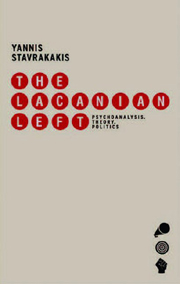Book contents
- Frontmatter
- Contents
- Bibliographical Note
- Acknowledgements
- Dedication
- Introduction: Locating the Lacanian Left
- PART I Theory: Dialectics of Disavowal
- PART II Analysis: Dialectics of Enjoyment
- 4 What Sticks? From Symbolic Power to Jouissance
- 5 Enjoying the Nation: A Success Story?
- 6 Lack of Passion: European Identity Revisited
- 7 The Consumerist ‘Politics of Jouissance’ and the Fantasy of Advertising
- 8 Democracy in Post-Democratic Times
- Bibliography
- Index
4 - What Sticks? From Symbolic Power to Jouissance
from PART II - Analysis: Dialectics of Enjoyment
Published online by Cambridge University Press: 12 September 2012
- Frontmatter
- Contents
- Bibliographical Note
- Acknowledgements
- Dedication
- Introduction: Locating the Lacanian Left
- PART I Theory: Dialectics of Disavowal
- PART II Analysis: Dialectics of Enjoyment
- 4 What Sticks? From Symbolic Power to Jouissance
- 5 Enjoying the Nation: A Success Story?
- 6 Lack of Passion: European Identity Revisited
- 7 The Consumerist ‘Politics of Jouissance’ and the Fantasy of Advertising
- 8 Democracy in Post-Democratic Times
- Bibliography
- Index
Summary
In the movement that leads man to an ever more adequate consciousness of himself, his freedom becomes bound up with the development of his servitude.
Jacques LacanTheories and practice
Throughout the first part of this book I have discussed central aspects of the work of major figures associated with the Lacanian Left. Engaging in a dialogue with the theoretico-political projects of Castoriadis, Laclau, Žižek and Badiou, I have tried to highlight the major contributions Lacanian theory has to offer to a critical understanding of political phenomena and to a much-needed ethicopolitical re-orientation. In the second part of The Lacanian Left I will be shifting my attention to a variety of concrete issues which can be fruitfully analysed and illuminated from the Lacanian viewpoint sketched in the preceding chapters. My main aim will be to address both what resists more traditional critical interpretations and what blocks the possibility of formulating and realising alternative political futures. How can one explain, for example, the grip of forms of identification and ideology that resist our conscious will to deconstruct or reconstruct them? Obviously, the Enlightenment signalled the dislocation of primordial attachments (objective reason) and their replacement by ideological attachments, changeable and constructed. We are now more than ever aware of the discursively constructed nature of social objectivity, of the central role of meaning in articulating, sedimenting and reproducing the various (material, economic, institutional) aspects of our social reality. But that does not mean that discourse is some neutral – transparent and immaterial – code, able to be recoded at will.
- Type
- Chapter
- Information
- The Lacanian LeftPsychoanalysis Theory Politics, pp. 163 - 188Publisher: Edinburgh University PressPrint publication year: 2007



